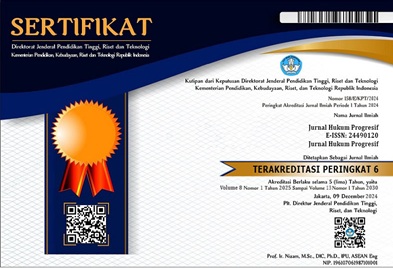KEDUDUKAN KEJAKSAAN DALAM SISTEM KETATANEGARAAN INDONESIA TERKAIT DENGAN INDEPENDENSI DALAM MENJALANKAN TUGAS DAN KEWENANGAN
Kata Kunci:
Kejaksaan, Kedudukan Kejaksaan, Konsep Ideal Independensi KejaksaanAbstrak
Jaksa sering kali dipandang bukan sebagai lembaga yang mewakili kekuasaan negara, melainkan sebagai alat untuk menindas masyarakat. Sebagai lembaga negara, kejaksaan berada dalam ranah kekuasaan eksekutif. Namun, dalam pelaksanaan kewenangan penuntutan, kejaksaan berperan sebagai pelaksana kekuasaan yudikatif. Penelitian ini bertujuan untuk memahami posisi Jaksa Agung Republik Indonesia dikaji dalam kerangka sistem ketatanegaraan negara, dengan fokus pada otonominya dan mengeksplorasi konsep ideal perannya dalam konteks ini. Penelitian ini menggunakan metodologi hukum normatif, dengan mengkaji peraturan perundang-undangan tertulis melalui berbagai sudut pandang, termasuk teori, data empiris, filsafat, dan hukum perbandingan, dengan memanfaatkan sumber primer dan sekunder. Penelitian ini mengkaji peran yudisial Kejaksaan sebagaimana yang tertuang dalam UU No. 16 Tahun 2004 dalam kerangka ketatanegaraan Indonesia. Hasil penelitian menunjukkan peran Kejaksaan tidak didefinisikan secara eksplisit dalam UUD 1945. Walaupun Pasal 24 ayat (3) menyebutkan badan penegak hukum yang terkait dengan kekuasaan yudikatif, pasal tersebut tidak memberikan definisi yang tegas mengenai posisi dan fungsi kejaksaan. Konsep idealnya, Kejaksaan RI seharusnya beroperasi di bawah kekuasaan Mahkamah Agung, sebagai lembaga kehakiman yang independen dan bebas dari pengaruh eksekutif. Oleh karena itu, perubahan diperlukan untuk memindahkan posisi kejaksaan dari lembaga eksekutif ke dalam ranah yudikatif.
The judiciary is often seen not as an implementer of state power, but as a tool to suppress society. As a state institution, the prosecutor's office is within the realm of executive power. However, in exercising prosecutorial authority, the prosecutor's office plays the role of executor of judicial power. This research aims to understand the position of the Prosecutor's Office of the Republic of Indonesia (RI) in the context of the Indonesian constitutional system, including its autonomy, as well as exploring the ideal concept of the prosecutor's office within this framework. The method used in this research is normative law, by analyzing written law from various perspectives, such as theory, history, philosophy and comparison, based on primary and secondary data. This study examines the juridical position of the prosecutor's office in accordance with Law Number 16 of 2004 in the Indonesian constitutional system. The research results show that the position of the Indonesian Prosecutor's Office has not been clearly regulated in the 1945 Constitution. Although Article 24 paragraph (3) mentions law enforcement bodies related to judicial power, this article does not provide a clear definition regarding the position and function of the prosecutor's office. The ideal concept is that the Indonesian Prosecutor's Office should operate under the authority of the Supreme Court, as a judicial institution that is independent and free from executive influence. Therefore, changes are needed to move the position of prosecutor from the executive branch to the judiciary.





